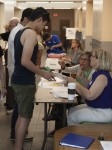Gov. Jerry Brown signed a bill Saturday that will automatically register all eligible voters when they obtain or renew their driver’s license or state identification card, but people will be able to opt out of the automatic registration.
California is the second state in the U.S. to pass an automatic voter registration law after Oregon.
Mark Baldassare, president of the Public Policy Institute of California, said the greatest effect will be on demographics with lower voter turnout such as young people or people with low incomes.
A PPIC statewide survey found that 44 percent of people between 18 and 34 were not registered to vote. Young adults make up 32 percent of the state’s adult population, but are only 17 percent of likely voters.
Some critics expressed concern that the new policy would register to vote people who had licenses through the Department of Motor Vehicles but are not eligible to vote.
Assemblywoman Lorena Gonzalez said in a press release Monday that she thinks the new law will allow legislators to focus on voter turnout.
“Removing an unnecessary barrier to voter registration will allow us to get down to the business of increasing actual participation,” Gonzalez said.
Lunna Lopes, a research associate at the PPIC, said the statewide survey team conducted a survey in May 2015 when the law was proposed.
Lopes said 69 percent of adults favored the proposal, but support was different among Republicans and Democrats. Lopes said support was higher among Democratic voters, while Republican voters were split over their support.
Zach Helder, the external vice president of UCLA’s undergraduate student government, said the new voter law will go a long way to helping his office reach its goal for increased voter turnout in 2016. Helder said he thinks it will be easier to argue issues such as in-state tuition and federal legislatures if voter turnout among students is higher.
“We are still in transition because everyone is not going to the DMV tomorrow, but a portion of the burden is taken off of our shoulders,” Helder said.
Helder said his office is planning engagement events to get students to register to vote, such as providing coffee and donuts during finals week for student registers.
Helder said he thinks the bill will increase voter turnout automatically and this will allow him to focus on making students more engaged with politics.
“People don’t register or vote because they don’t feel engaged with the process and don’t feel like it matters,” Helder said.
Emily Gray, a fourth-year English student, said she thinks the new law will be beneficial for busy students who haven’t registered, but wasn’t sure if it would result in a higher voter turnout.
“Having to go through the process of registering can be a deterrent for students, so it takes away an obstacle for them,” Gray said. “I’m not sure if this will actually lead to a higher voter turnout because people who really want to vote will have already registered.”
The law will go into effect on Jan. 1, but the new registration process will likely not be offered until June 2016, around the time of the primary election.
